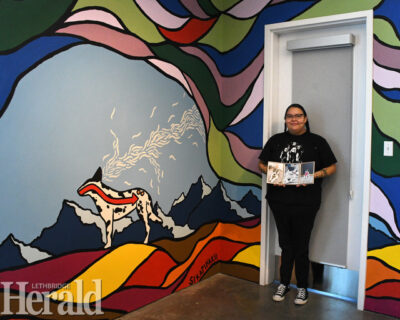Artist’s late dog inspires SAAG exhibit
By Theodora MacLeod - Lethbridge Herald Local Journalism Initiative Reporter on January 31, 2024.
 Herald photo by Theodora MacLeod
Sikapinakii Low Horn holds photos of Apikayii, the artist's dog who recently passed and which helped inspire the mural and exhibition 'Imiitaik'iistsik'ooni'' which opened on Saturday at SAAG.
Herald photo by Theodora MacLeod
Sikapinakii Low Horn holds photos of Apikayii, the artist's dog who recently passed and which helped inspire the mural and exhibition 'Imiitaik'iistsik'ooni'' which opened on Saturday at SAAG.The relationship between humans and dogs goes back centuries and has taken many forms. From co-workers to trusted companions, dogs have shaped the lives of their humans so significantly they can be seen in works of art dated back to the first century A.D. with Pomeii’s Cave Canem, a monastic that survived the eruption of Mt. Vesuvius and was uncovered.
Since Cave Canem, dogs have been featured in works by Goya, Cassius Marcellus Coolidge, Landeer, and Warhol. As of Saturday, another artist had joined the ranks of those to be inspired enough to feature their dog in art.
As part of the first exhibition of the year, the Southern Alberta Gallery welcomed Sikapinakii Low Horn, a multidisciplinary, Indigenous artist who has transformed the library gallery with a mural and creative use of window shadows.
Towards the centre of Low Horn’s piece, which features a landscape of prairies, hills, and the peaks of mountains, sits the image of a black and white spotted dog. The breath of life is painted going through it, with two spots on its hind representing the kidneys and liver.
The dog represents Low Horn’s recently passed companion, Apikayii who died suddenly just a week and a half before the exhibition opened.
Low Horn says the original inspiration for the mural came from what Blackfoot people often refer to as the dog days – a time before horses became a part of daily life, when dogs were used to help haul the camp as they travelled, mainly around the 18 and 19 centuries.
“You can tell when the dog days era is in photos… by the size of the tipis, because the tipis are much smaller because the dogs hauled them,” says Low Horn, who named the piece “Imiitaik’iistsik’ooni,” which translated from Blackfoot, means “dog days.”
The role of dogs was for more than just physical labour though; they were protection, but most of all they were, and still are to many people, companions.
Apikayii came to Low Horn after a fire at a relative’s house left that left a litter of puppies on Siksika First Nation without shelter.
Apikayii, which means ‘skunk’ in Blackfoot, was the only one of the litter to be singed by the fire. But as Low Horn describes her, the early experience didn’t impact dog’s spirit.
“When she passed away last week there were so many people who had met her and they were like ‘oh my gosh, I’m so sorry, she was the best dog.’ And I was like ‘hell yes, she was’… I think doing it this way, it helps me.”
Dogs make appearances throughout Blackfoot teachings, including, as Low Horn shares, the story of the old man and his dog who died to protect his owners from bad fortune that was coming to them, a story Low Horn says brings comfort after the sudden death of Apikayii.
Apikayii was trained to respond to commands in Blackfoot, she travelled everywhere with Low Horn, and now her likeness is memorialized on the wall of the library gallery at SAAG until April 20.
Low Horn says losing Apikayii was heartbreaking.
“It was really hard. But I think instead of dealing with it privately, I think doing it this way is really helping me heal… Celebrate.”
16-15




